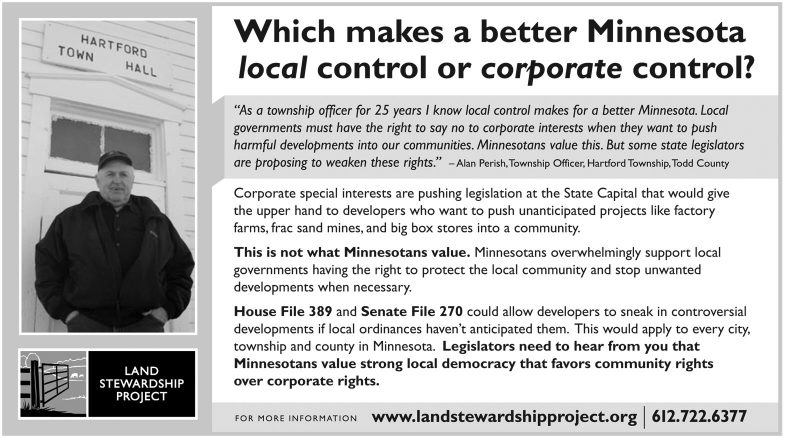When Alan Perish passed away May 14, we lost a stalwart advocate for family farming and local democracy.
Alan, a fourth-generation farmer, milked cows in central Minnesota’s Todd County for many years and he was a longtime Land Stewardship Project and Minnesota Farmers Union member. Over the years, I had several opportunities to talk with him about the key role a family farm form of agriculture can play in healthy rural communities and our food system in general. No matter if he was talking to a neighbor, a roomful of legislators, or the media, Alan made one thing clear: a vibrant, economically-viable system of farming and strong local democracy are not mutually exclusive. In fact, they go hand-in-hand.
That’s why, up until his death, he served as president and manager of Hartford Township in Todd County. And it’s why he chose to be so integral to the Land Stewardship Project’s work related to protecting and strengthening local democracy on the township and county level. He served on LSP’s State Policy Steering Committee, and helped develop policy positions related to local democracy and support of small and medium-sized farms, among other issues. In his straightforward, no-nonsense manner, Alan often spoke in public about the importance of local control in rural communities. At one point, as the image below shows, he was featured in an LSP campaign advocating for protection of township rights.

Being so public about an issue like this in Rural America is significant, given that the common narrative generated by the backers of a corporate-controlled form of economic activity is that communities cannot thrive when local residents have a say in what kinds of development — whether it be a CAFO, frac sand mining operation, or housing subdivision — takes place there. They’ve often used this narrative to silence those who feel that the people who live and work in a community are the ones who should have a say in what kind of activity drives the economy and dominates the landscape. Big Ag, in particular, has been extremely effective at promulgating the concept that if one questions any aspect of crop and livestock production, then one is attacking all forms of farming.
Alan saw such an argument for what it was: a form of bullying meant to advance the interests of a select few while sucking wealth out of rural communities and putting small and medium-sized farms out of business. This humble farmer taught me a lot about the importance of speaking up, even when the powers that be are propagating a myth that no one else shares your view of the world.
Sometime back, I had the opportunity to interview Alan for LSP’s 40th anniversary oral history, Making Change from the Ground Up. Despite being quite ill at time, his fiery passion for local democracy and family farming still shined through during our conversation. Here’s what he shared with me:
If you can’t control things locally, somebody else is going to control them for you, and their ideas are often about who can make the most money the fastest. And the only way to make money fast is to not filter it down to the local people who live in the community. If the size of the operations gets too big, the communities suffer, they suffer a lot. All you have to do is drive through any of these small communities and see all the boarded-up stores. Or in several of these small communities, one person may own two or three businesses or more, or the owner of that business lives out of town in another community. But if you’ve got 10 businesses in town, and you’ve got 10 owners of those businesses in town, they’re all contributing to the welfare of the community.
Working with LSP organizers like Paul Sobocinski and Bobby King, I had a chance to testify on local control at the Minnesota Legislature. I did it more than once, but I know on one particular day I made a difference. I didn’t necessarily change some minds, but they kind of figured out they couldn’t have it their way as far as weakening local township and county government. Of course, there were segments of the Legislature that wanted to eliminate local control and local planning and zoning and people’s ability to control what’s going on in their own communities. But I think some of the lawmakers were surprised at how much support there was for local control because they didn’t have any good firsthand knowledge of the situation. People from the Minnesota Association of Townships were in the hearing room also, and they were really impressed. They said, “By golly, maybe we need to have you come down and do some more testifying for us.” Local control is still under fire, but today the opponents are using different tactics — they’re accomplishing their goals by putting people out of business.
I also served on LSP’s State Policy Committee for awhile. We had good, thoughtful discussions and helped the organization stay on track with their lobbying efforts and policy and such. There was quite a variety of people on that committee, and I think we helped keep the organization true to the roots where it belonged. Local control was one of the big issues. Frac sand mining came into play right at the end of my time on the committee, and that’s basically a local control issue.
When people ask what local democracy looks like in Minnesota, I think of people like Alan Perish.
A Mass of Christian Burial for Alan will take place on Thursday, May 22, at 11 a.m., at the Christ the King Catholic Church in Browerville, Minn. Details are here.
Brian DeVore is LSP’s managing editor.